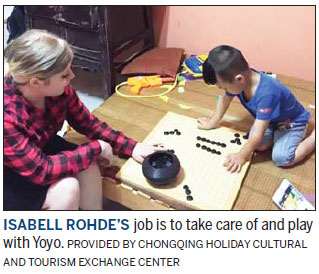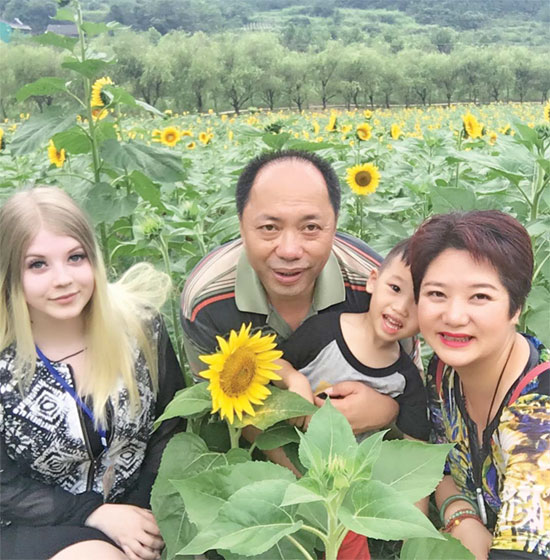Chinese families meet the AU pair

A program that started in Europe is now spreading on the mainland, as young people seek some foreign experience before college
Three-year-old Yoyo has a special friend in his home.
Isabell Rohde, 18, from Spangenberg, a small town in central Germany, is spending six months as an au pair with Yoyo's family in southwest China's Chongqing.
| IsIsabell Rohde on a trip with Pu Yongjian's family. Provided by Pu Yongjian |
Like many European peers, the young woman decided to take a gap year to experience some foreign culture before going to college.
"I was looking for an opportunity to experience a different culture after finishing high school," Rohde says.
"It's my first time abroad."
At Yoyo's home, her main duty is to take care of the boy, play with him and teaching him some English. She also is taking a Chinese-language course and traveling with her host family.
The au pair program originated in Europe after World War II to promote cultural exchanges among young Europeans.
Au pair, a French term, means "at par" or "equal to", and indicates that the au pair is on par with other members of the family, rather than a traditional domestic help or nanny.
Au pairs live with their host families and look after the children. In return, they get an allowance and opportunities to study a foreign language.
Due to visa restrictions and limited demand, the au pair program was not introduced in China until the early 2000s.
At first, it was Chinese au pairs going out, mainly to the United States, as some American parents started to realize the importance of learning Chinese.
In 2006, Yu Hongbin, from Harbin, in northeastern China's Heilongjiang province, was the first Chinese au pair to land in the US, according to The New York Times.
In China, the demand for au pairs has started to grow in recent years as some affluent Chinese parents want their children to have a hands-on experience with a foreign language.
In 2014, a Chinese movie, When a Peking Family Meets Au Pair, drew public attention to this concept.
Based on the experiences of a Chinese host family, the movie shows how a traditional Chinese family gets along with a Colombian au pair called Natalie.
Yoyo's father, Pu Yongjian, an economics professor at Chongqing University, learned about the au pair program this year through an English teacher whose friend runs an au pair agency in Chongqing.
"My son likes English very much, so I want to have an English-speaking au pair to help him practice the language at home," says Pu.
But at first, the agency told him it might take a while to find an au pair who wants to come to Chongqing, a large but lesser-known Chinese city in the underdeveloped western region. Typically, foreign au pairs want to live in Beijing or Shanghai.
"Bai Mei (the Chinese name Pu gave to Rohde, which means white plum blossom) is an exception," says Pu.
"She wanted to go to the 'backward' part of China."
Pu says his academic and professional background also attracted the German student, who plans to pursue an economics degree in college when she returns home.
Ma Senhu, general manager of the Chongqing Holiday Cultural and Tourism Exchange Center, which helped Pu find the German au pair, says great care is taken to match each au pair with a family.
"Our clientele comprises well-educated professionals with international exposure, such as professors, lawyers and entrepreneurs." Ma says.
There are about 10 agencies involved in the au pair program in China. About 700 foreign au pairs came to the country last year, says Ma.
"Thanks to the country's fast growth, an increasing number of young foreigners are applying for positions in China," he says.
The agency has matched 15 Chongqing families with au pairs this year.
"The selection process is mutual," says Ma, adding that the two sides communicate directly via email and video chats to see if they click.

"Almost no foreign au pair can speak Chinese, so Chinese parents need some foreign language skills," he says.
Meanwhile, though an increasing number of Chinese parents are buying into the program, some have concerns about the system.
She Ke, editor-in-chief of a fashion magazine and a mother of two young children, says: "I cannot imagine having a foreigner living in my home. "It can lead to lot of cultural and lifestyle conflicts. For instance, do I have to prepare Western food for the au pair every day?"
Zhuang Yilin, a senior manager at a multinational company in Shanghai and also a mother of two, has been thinking about having an au pair for some time.
"It is not easy to find a trustworthy one," she says. "I want an au pair with a good personality and a positive attitude. I have heard some negative feedback about au pairs in China, so I am being very cautious."
Language experts also say that it is not necessary to have an au pair for Children of a very young age.
"While having a native speaker at home is obviously the best way to pick up a foreign tongue, if the child is only 3 years old, the au pair is just a babysitter and cannot teach the child a lot. I think the proper age (for a child to have an au pair) is around 10," says Liu Jian, chief academic officer of Best Learning, an English-language training center.
tanyingzi@chinadaily.com.cn
(China Daily Africa Weekly 09/23/2016 page19)
Today's Top News
- Experts: Lai not freedom fighter, but a pawn of the West
- Hainan evolves as gateway to global markets
- Opening up a new bridge between China and world
- Tour gives China-Arab strategic trust a boost
- China accelerates push for autonomous driving
- Opening of new gateway can help foster global economic and trade cooperation































